| Srl | Item |
| 1 |
ID:
112813
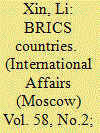

|
|
|
|
|
| Publication |
2012.
|
| Summary/Abstract |
THE MAN WHO COINED the acronym BRIC probably did not even imagine that it would later be filled with real content and would acquire viability. Indeed, the nations that became part of this association are located at the most different points of the planet - in Asia, Africa, Europe, and Latin America. Nevertheless, the development of the economic structures of the BRICS countries has brought about a diversification of the world economy and global market, previously focused mainly on the U.S. and Western countries. In the process of the reform of global economic governance, these countries stand on similar ground; they strengthen coordination of actions and cooperate with each other. These countries are at similar stages of development and tackle approximately the same tasks: economic growth, internal stability and social development. Their advantage lies in the fact that their economies are complementary, which provides a broad field for cooperation within the scope of one organization and with the rest of the world. It is safe to say that the BRICS countries are active supporters and practitioners of global partnership for development and a bridge for North-South dialogue and cooperation
|
|
|
|
|
|
|
|
|
|
|
|
|
|
|
|
| 2 |
ID:
123509
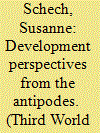

|
|
|
|
|
| Publication |
2012.
|
| Summary/Abstract |
Is there a distinctive Antipodean approach to development? In this introduction I take up Raewyn Connell's challenge to explore the possibilities for knowledge production that reflects Australia's and New Zealand's geographical situation of rich peripheral countries and their history of settler colonisation. While Antipodeans' contributions to development theory have been limited, their work is characterised by close connections between theory and practice. The Antipodes' positioning as global North in the geographical South has stimulated a search for alternative approaches to development knowledge. This is variously pursued through collaborative research relationships with indigenous communities, close engagement with non-Western cultural frameworks, and a focus on marginal spaces and positions. As the centre of global economic power shifts to the South, existing development relationships and established ways of doing development are increasingly challenged by newly constituted subject positions and coalitions.
|
|
|
|
|
|
|
|
|
|
|
|
|
|
|
|
| 3 |
ID:
109722
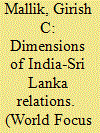

|
|
|
| 4 |
ID:
103702
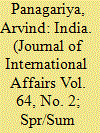

|
|
|
| 5 |
ID:
100371
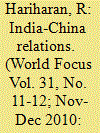

|
|
|
| 6 |
ID:
151127
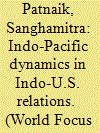

|
|
|
|
|
| Summary/Abstract |
The shift in global economic power from the West to East and the evolving geostrategic importance of the Indo-Pacific region has added new dynamics in Indo-U.S. relations. It paves the way for both cooperation and competition among the so called established and emerging powers in the region. While there is economic convergence, the geostrategic uncertainties make the whole region full of challenges and opportunities as well. The US rebalance, conflict and cooperation in the Indo-Pacific and non-traditional threats in the region are of great implications for Indo-U.S. relations. The United States has been deeply engaged in the region – militarily, economically, and diplomatically during World War II and throughout the Cold War.
|
|
|
|
|
|
|
|
|
|
|
|
|
|
|
|
| 7 |
ID:
121550
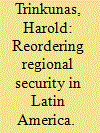

|
|
|
|
|
| Publication |
2013.
|
| Summary/Abstract |
In the wake of the Cold War, regional democratization and economic liberalization were supposed to usher in an opportunity to build a common hemispheric security agenda, designed to unite the United States and Latin America in collaboration against the "new" security threats posed by organized crime and violent nonstate actors. Two decades later, the threats remain much the same, yet the hemispheric security agenda has fragmented, replaced in part by projects designed to build specifically South American regional institutions. As some scholars predicted, heterogeneous threat perceptions across the region, differences over democratization, and tensions over the effects of free trade and market liberalization have confounded the effort to build a hemispheric security agenda. Yet the efforts by former President Hugo Chávez of Venezuela to radically transform the regional security order by building a Bolivarian alliance of states as an explicit counterweight to U.S. power have also fallen short. Instead, Brazil's ascent as a global economic power and the growing prosperity of the region as a whole has created an opportunity for Brazil to organize new mid-range political institutions, embodied in the Union of South American States (UNASUR), that exclude the United States yet pursue a consensual security agenda. This emerging regional order is designed by Brazil to secure its leadership in South America and allow it to choose when and where to involve the United States in managing regional crises. Yet, Brazil is finding that the very obstacles that confounded hemispheric security collaboration after the Cold War still endure in South America, limiting the effectiveness of the emerging regional security order.
|
|
|
|
|
|
|
|
|
|
|
|
|
|
|
|
| 8 |
ID:
103155
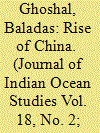

|
|
|